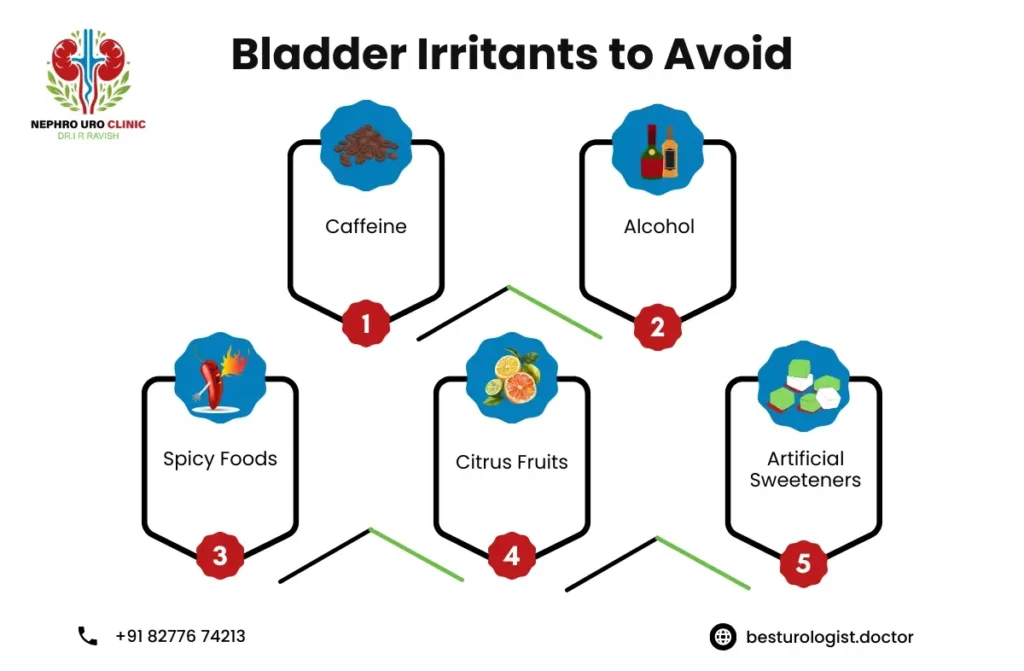Your bladder plays an essential role in your body’s urinary system, storing and releasing urine. However, maintaining bladder health is often overlooked until problems arise. From managing everyday discomforts to preventing long-term conditions, understanding how to improve bladder health how to strengthen your bladder and can lead to a more comfortable and confident life. In this blog, we will explore common bladder problems, lifestyle tips to maintain bladder health, and when it’s time to seek professional help.
By the end of this article, you’ll have a clear understanding of the steps you can take to improve bladder health, strengthen your pelvic floor, better bladder supplement and make lifestyle changes to keep your bladder functioning well.

How to Improve Bladder Health: 7 Effective Hacks
Your bladder plays a vital role in your body’s overall health, but it’s often overlooked. By adopting the right practices, you can maintain a healthy bladder and avoid common issues like infections, incontinence, or overactive bladder. Read on to discover how to improve bladder health with these seven effective hacks.
Stay Hydrated … but Don’t Drink Fluids All at Once
Water is essential for flushing out toxins and maintaining optimal bladder function. Aim for 6–8 glasses of water daily, but avoid consuming large amounts all at once. Spacing out your fluid intake helps prevent overloading the bladder while ensuring proper hydration.
- Tip: Drink more water in the morning and early afternoon to avoid frequent trips to the bathroom at night.
Keep Away from Bladder Irritants
Certain foods and drinks can irritate the bladder, worsening symptoms like urgency or discomfort. Common irritants include:
- Caffeine (coffee, tea, energy drinks)
- Alcohol
- Spicy or acidic foods (citrus, tomatoes, chili peppers) If you’re wondering how to improve your bladder, start by limiting these triggers and choosing bladder-friendly alternatives like herbal teas, fresh fruits, and vegetables.
Don’t Hold in Urine
Resisting the urge to urinate can stretch your bladder muscles and increase the risk of infections. Over time, this habit can weaken your bladder, making it harder to empty completely.
- Solution: Visit the restroom every 3–4 hours to maintain a healthy pattern.
Remember, regular urination is a key step in how to improve bladder function and prevent urinary tract infections (UTIs).
Follow Bladder Hygiene Practices
Practicing good hygiene helps reduce the chances of infections. Follow these tips for optimal bladder care:
- Always wipe from front to back after using the toilet.
- Empty your bladder completely after urinating.
- Wear breathable cotton underwear to prevent moisture buildup.
- Avoid using heavily scented soaps or feminine hygiene products.
These habits not only show how to improve bladder health but also protect your urinary tract.
Take Care of Your Overall Health
Bladder health is closely connected to your overall well-being. Conditions like diabetes, obesity, and chronic constipation can strain the bladder or weaken surrounding muscles.
- Maintain a balanced diet: Include fiber-rich foods to prevent constipation.
- Stay active: Exercise helps maintain a healthy weight, reducing pressure on the bladder.
Addressing your overall health is an essential component of how to improve bladder function naturally.
Strengthen Your Pelvic Floor
Your pelvic floor muscles support the bladder and play a critical role in controlling urination. Strengthening these muscles improves bladder control and reduces the risk of leaks.
- Pelvic floor exercises (Kegels):
- Tighten the muscles used to stop urination.
- Hold for 5 seconds, then relax for 5 seconds.
- Repeat 10 times, 2–3 times daily.
By incorporating this routine, you’ll learn how to improve your bladder and enhance overall urinary health.
Don’t Be Shy: Ask About Bladder Health
Many people hesitate to discuss bladder issues due to embarrassment. However, seeking professional advice can lead to better management and improved quality of life.
- Visit a urologist if you experience symptoms like frequent urination, burning, or pain.
- Consider bladder training programs if recommended by your doctor.
Taking proactive steps to consult a specialist is an empowering way to explore how to keep bladder healthy naturally.
Common Bladder Problems and When to Seek Help
Bladder issues can affect people of all ages, but they are especially common as we get older. Some common bladder problems include:
Urinary Incontinence
Urinary incontinence is the inability to control the bladder, leading to involuntary leakage. This condition can range from occasional leaks when you sneeze or cough to more severe cases where you can’t make it to the bathroom in time. If you are experiencing frequent leakage, it’s essential to seek help to identify the underlying cause and explore treatment options.
Urinary Tract Infections (UTIs)
UTIs are infections in any part of the urinary system, but they most commonly occur in the bladder and urethra. Symptoms include a burning sensation while urinating, frequent urination, and cloudy or strong-smelling urine. If left untreated, UTIs can spread to the kidneys and cause more severe health issues. If you experience these symptoms frequently, consult a doctor to address the infection and prevent recurrence.
Overactive Bladder (OAB)
OAB causes a sudden and uncontrollable urge to urinate, often leading to frequent trips to the bathroom. This can severely impact your daily activities. Treatments are available to manage OAB, so it’s crucial to seek professional help if you find yourself frequently needing to use the restroom.
If you are experiencing any of these bladder problems, it’s important to consult a healthcare provider to discuss treatment options and ways to improve bladder health.

How to Strengthen Your Pelvic Floor
Strengthening your pelvic floor muscles is one of the most effective ways to improve bladder health and manage conditions like urinary incontinence. Your pelvic floor muscles support the bladder, and exercises that target these muscles can help reduce leakage and improve control.
Pelvic Floor Exercises (Kegel Exercises)
Kegel exercises involve tightening and holding the muscles that control urine flow. Here’s how to perform them:
- Identify the right muscles: The easiest way to locate your pelvic floor muscles is to stop urination midstream. Once you know which muscles to target, avoid performing Kegels while urinating to prevent incomplete bladder emptying.
- Perform the exercise: Tighten your pelvic floor muscles and hold for three to five seconds, then relax for the same amount of time. Repeat this 10 times, working up to three sets per day.
- Incorporate into daily routine: You can perform Kegel exercises anywhere and at any time – while sitting at your desk, watching TV, or even standing in line.
By doing Kegel exercises regularly, how to keep bladder healthy naturally control and reduce incontinence over time.
Follow a Healthy Eating Plan
A balanced diet plays a significant role in maintaining a healthy bladder. Certain foods and beverages can irritate the bladder and worsen symptoms of incontinence or overactive bladder. Following a healthy eating plan can help you achieve a better bladder.
Foods to Eat for Bladder Health
- High-fiber foods: Constipation can put pressure on the bladder and worsen symptoms of incontinence. A diet rich in fiber from fruits, vegetables, and whole grains can promote regular bowel movements and relieve pressure on the bladder.
- Water-rich foods: Foods like cucumbers, melons, and lettuce have high water content and can help keep you hydrated without overloading the bladder.
- Lean proteins: Fish, chicken, and plant-based proteins support overall health without irritating the bladder.
Foods and Beverages to Limit
- Caffeine: Found in coffee, tea, and some sodas, caffeine is a known bladder irritant that can increase urgency and frequency.
- Alcohol: Alcohol acts as a diuretic, which can lead to more frequent urination and bladder irritation.
- Spicy foods: While delicious, spicy foods can irritate the bladder and increase discomfort.
- Artificial sweeteners: Sugar substitutes like aspartame and saccharin can irritate the bladder in some individuals.
By incorporating bladder-friendly foods and avoiding known irritants, you can improve bladder health and reduce the frequency of bladder problems.
Keep Away from Bladder Irritants
In addition to adjusting your diet, it’s crucial to identify other bladder irritants in your daily life. Reducing or eliminating these triggers can go a long way in improving bladder function.
Common Bladder Irritants to Avoid
- Smoking: Smoking is a significant risk factor for bladder cancer, and it can also irritate the bladder lining, leading to frequent urination and discomfort.
- Dehydration: Not drinking enough water can lead to concentrated urine, which irritates the bladder and increases the risk of UTIs. Aim to drink six to eight glasses of water a day to keep your bladder functioning well.
- Perfumed hygiene products: Feminine hygiene sprays, scented toilet paper, and certain soaps can irritate the bladder and urethra. Opt for unscented, gentle products.
By making simple lifestyle changes, such as avoiding bladder irritants and staying hydrated, you can promote a better bladder and prevent common bladder problems.
Things That Affect Bladder Health
Several factors can impact bladder health, many of which are related to age, lifestyle, and pre-existing medical conditions. Understanding these factors can help you take the necessary steps to improve bladder health.
Aging
As we age, the bladder muscles weaken, leading to reduced bladder capacity and control. This is why urinary incontinence and overactive bladder become more common in older adults. Regular pelvic floor exercises and maintaining a healthy lifestyle can help mitigate these effects.
Obesity
Carrying excess weight puts pressure on the bladder, leading to an increased risk of incontinence. Losing weight through diet and exercise can relieve some of this pressure and improve bladder control.
Pregnancy and Childbirth
Women who have given birth may experience weakened pelvic floor muscles, which can lead to urinary incontinence. Strengthening the pelvic floor with Kegel exercises is particularly beneficial for women after childbirth.
Medical Conditions
Conditions such as diabetes, multiple sclerosis, and stroke can affect nerve signals to the bladder, resulting in incontinence or retention issues. Regular check-ups with a healthcare provider can help manage these conditions and improve bladder health.
Conclusion
Bladder health is a vital part of overall well-being, and taking proactive steps can significantly reduce the risk of bladder problems. From strengthening your pelvic floor to following a bladder-friendly diet, there are many ways to improve bladder health. If you experience symptoms of bladder issues such as incontinence, frequent urination, or pain, don’t hesitate to seek medical advice.
Dr. I R Ravish, a renowned urology specialist with over 28 years of experience, can provide expert care and personalized treatment for various bladder conditions. For professional guidance and to learn more about how to improve bladder health, schedule a consultation with Dr. Ravish today.




